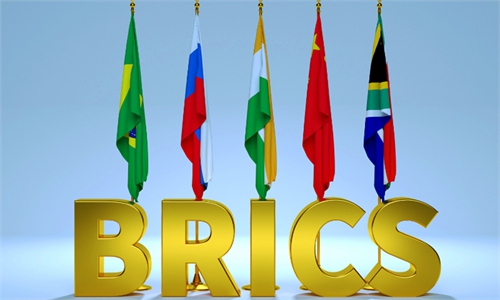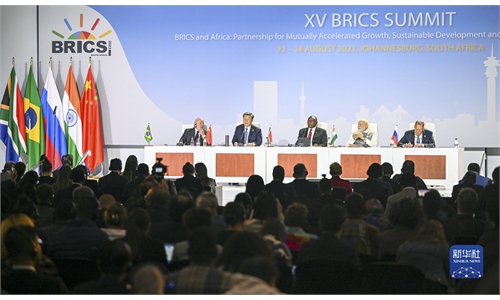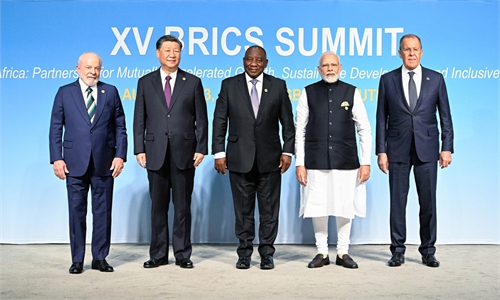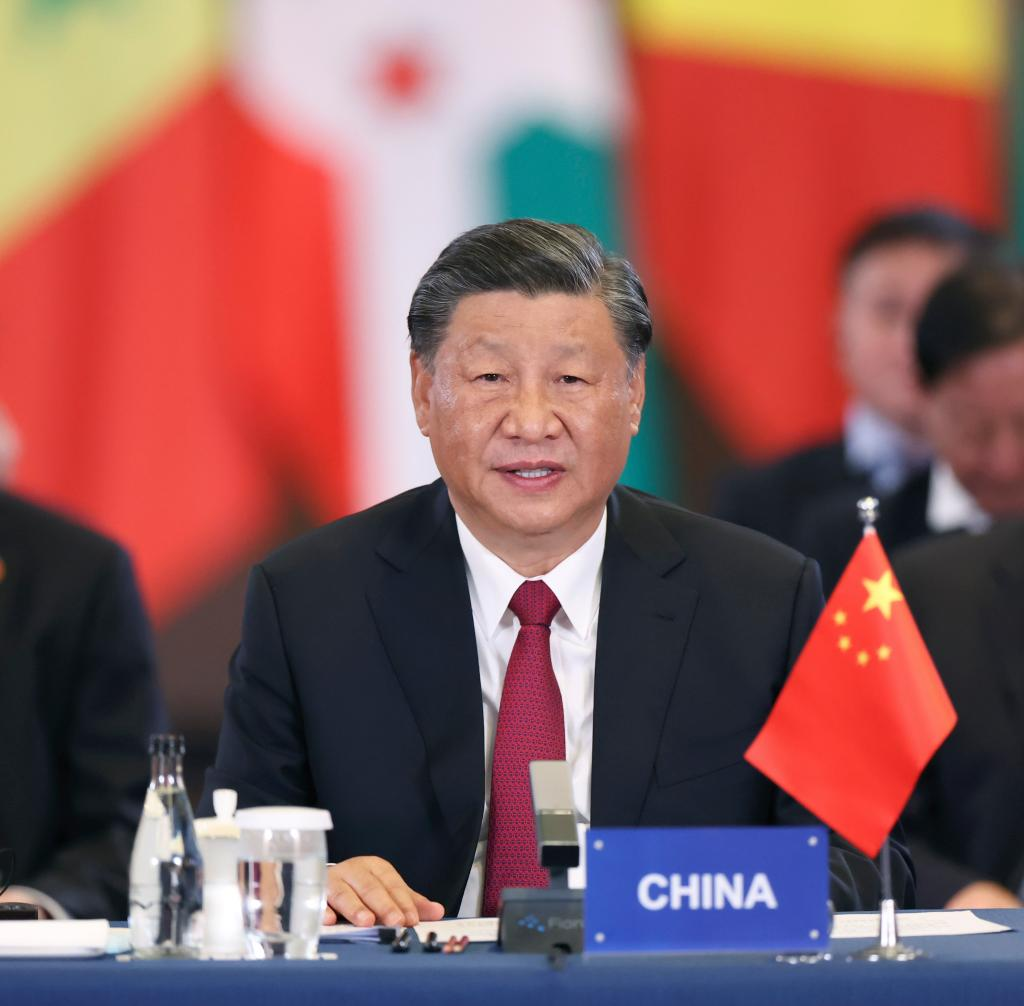
Chinese President Xi Jinping delivers a keynote speech at the China-Africa Leaders' Dialogue in Johannesburg, South Africa, Aug 24, 2023. Xi co-chaired with South African President Cyril Ramaphosa the China-Africa Leaders' Dialogue on Thursday. Photo:Xinhua
Chinese President Xi Jinping returned to China on Friday after wrapping up his 10th visit to the African continent, during which he attended the 15th BRICS Summit and paid a state visit to South Africa. Observers said that the Chinese leader's trip to Africa not only promoted and witnessed the historic expansion of the BRICS mechanism, but also further helped built a closer China-Africa community with a shared future, contributing to true multilateralism.
President Xi and other BRICS and African leaders gathered in Johannesburg, South Africa, this week for the BRICS summit. On Thursday, President Xi co-chaired with South African President Cyril Ramaphosa the China-Africa Leaders' Dialogue in Johannesburg, during which Xi urged China and Africa to join hands for modernization and put forward three initiatives to support Africa's industrialization, agricultural modernization and talent development.
President Xi said that China is pursuing the great rejuvenation of the Chinese nation on all fronts through a Chinese path to modernization, while Africa is making all-out efforts to build a new Africa that enjoys peace, unity, prosperity and strength.
China and Africa should work together to build an open and inclusive world economy, advocating for the building of an open world economy, where developing countries are better involved in the international division of labor and share the fruits of economic globalization, said Xi.
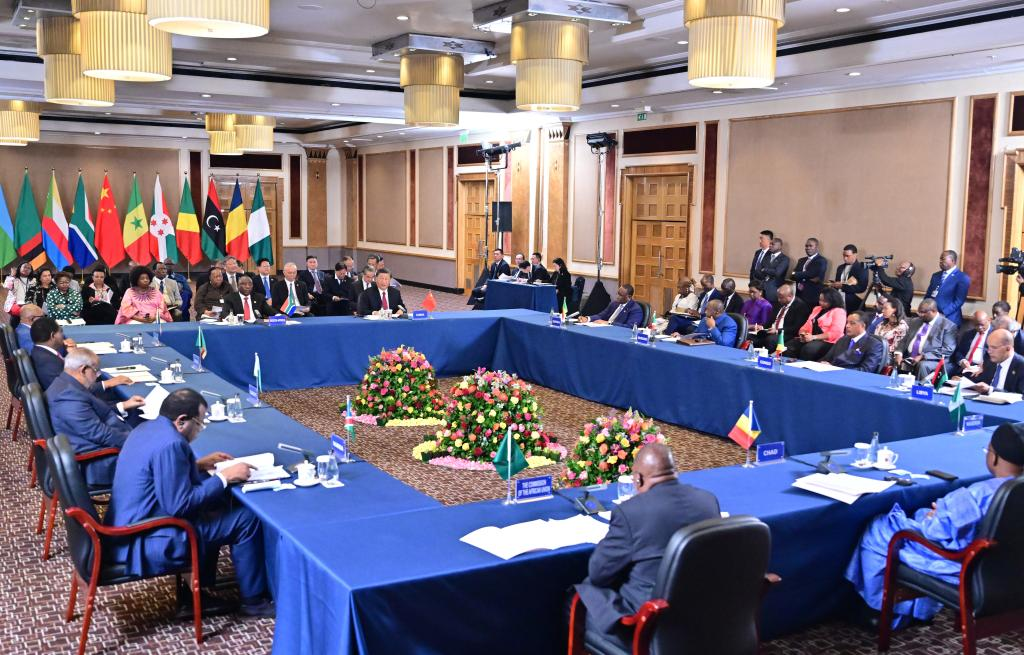
Chinese President Xi Jinping co-chairs with South African President Cyril Ramaphosa the China-Africa Leaders' Dialogue in Johannesburg, South Africa, Aug 24, 2023. Photo:Xinhua
This is the first offline meeting between Chinese and African leaders since the COVID-19 pandemic, which will deepen China-Africa relations, analysts said, noting that Xi's participation in the BRICS Summit in Africa and the meeting with African leaders are helping to draw the blueprint for future China-Africa cooperation and will further promote the building of a closer China-Africa community with a shared future.
Moreover, during the summit, Xi also had offline face-to-face meetings with BRICS and also many African leaders, which were conducive to consensus-building and to Global South cooperation, and will inject more impetus into global stability and development, they said.
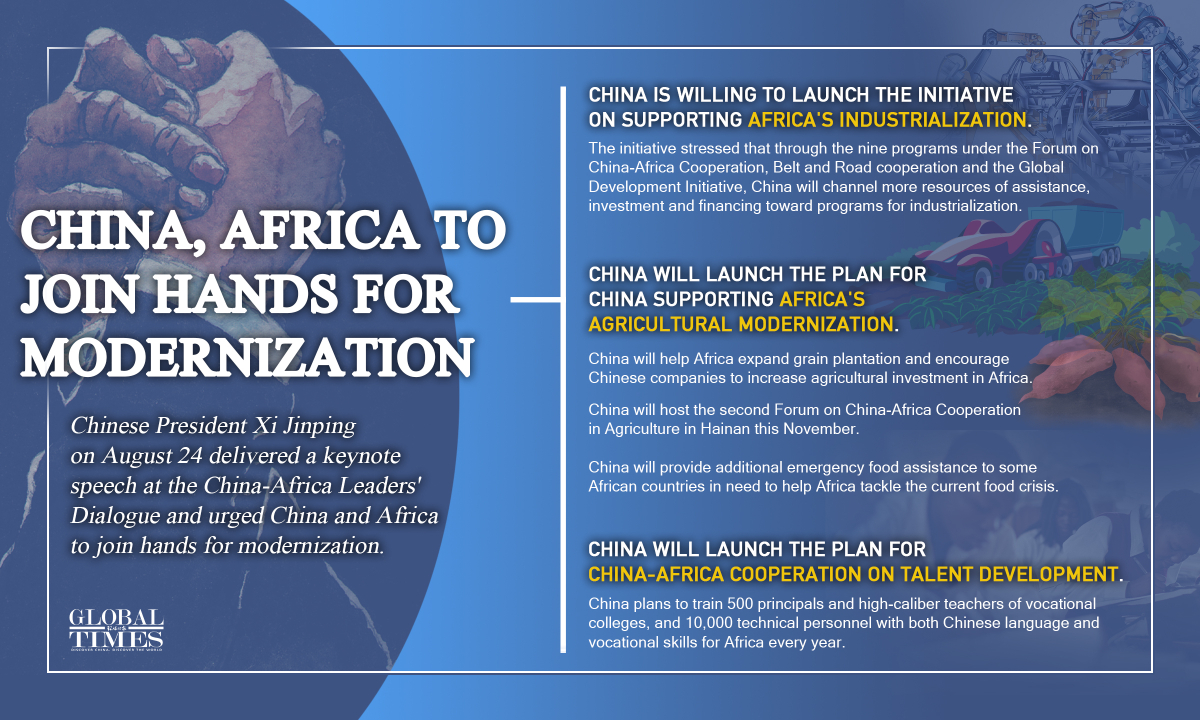
Chinese President Xi Jinping urges China, Africa to join hands for modernization. Graphic:GT
Blueprint for cooperation
During the meeting with African leaders on Thursday, to chart the course for China-Africa practical cooperation in the next stage and assist in Africa's integration and modernization, President Xi put forward three initiatives - Initiative on Supporting Africa's Industrialization, the Plan for China Supporting Africa's Agricultural Modernization, and the Plan for China-Africa Cooperation on Talent Development.
President Xi noted that next year, China will host the Forum on China-Africa Cooperation (FOCAC), where China and Africa may come together again and draw up new plans for development.
He also expressed confidence that China and Africa will carry forward their traditional friendship, enhance solidarity and coordination, and bolster cooperation across the board. As China and Africa join hands to advance modernization, they will deliver a better future for the Chinese and African people, and set a fine example in the building of a community with a shared future for mankind.
These three initiatives on industrialization, agriculturalization, and talent development reflect Africa's aspirations for modernization and are also the core for development in Africa's Agenda 2063 development blueprint, which highlights China's inherent and consistent support for Africa's development, Song Wei, a professor from the School of International Relations at Beijing Foreign Studies University, told the Global Times.
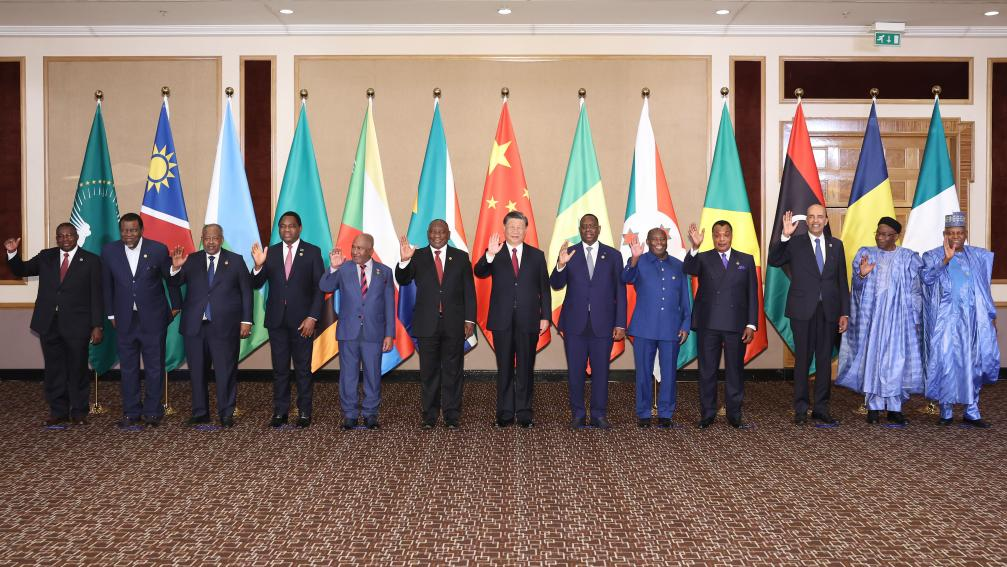
Chinese President Xi Jinping poses for a group photo with participants attending the China-Africa Leaders' Dialogue in Johannesburg, South Africa, Aug 24, 2023. Photo:Xinhua
Given Africa's relatively low manufacturing capacity, the initiative on industrialization shows that China is committed to transferring its strong production capacity to Africa to enhance its position in the global value chain, said Song.
Agriculture is also a vital aspect of Africa's development. With its vast land and large population, supporting Africa's agricultural modernization also contributes to solving Africa's food security issues and making positive contributions to global food security, Song said.
Agricultural cooperation between China and Africa has been going on for several decades. Dr. Sylvester Anami, a senior research fellow at the Jomo Kenyatta University of Agriculture and Technology in Kenya, told the Global Times that the impressive rural transformation and agricultural modernization in China, which involves the utilization of precision agriculture and the implementation of leading digital technologies, has resulted in the lifting of millions of people out of poverty.
The continuous provision of technical support and expertise in agricultural modernization by China has the potential to bring about a revolution in food and nutrition security in Africa, said Dr Anami.
Under the initiative on agriculture put forward by President Xi, China will further help Africa expand grain plantation, encourage Chinese companies to increase investment, and enhance cooperation with Africa on seed and other areas of agro-technology, to support Africa in transforming and upgrading its agricultural sector, analysts said.
Song also noted that talent development is the core foundation for any development plan and the initiative in cultivating talents for Africa will also help support the other two initiatives. Moreover, Africa has the youngest population in the world, and promoting talent development not only benefits African youth but also directly increases their skills for employment, thus boosting Africa's employment rate and promoting social stability.
China plans to train 500 principals and high-caliber teachers of vocational colleges, and 10,000 technical personnel in both Chinese language and vocational skills for Africa every year. China will invite 20,000 government officials and technicians from African countries to participate in workshops and seminars, according to the initiative on talent development.
In response to some Western media hype that China's economic strength is declining and its influence in Africa will be frustrated, Song said that these narratives reflect the strong fear and unease of the West and the US toward the China-Africa community with a shared future, as China-Africa cooperation has continued to upgrade.
China's influence in Africa has expanded, which has raised concerns among some countries outside the region, especially the US, which increasingly views China as a major competitor in Africa and suppresses China by fabricating accusations such as debt traps and debt diplomacy. However, African people, with a rational attitude, see through these fabrications and understand that they are baseless, said Song.
The cooperation between China and Africa has brought tangible development to African countries. The "debt trap" rhetoric is more of a political narrative and propaganda pushed to discourage Africans from getting these loans from China, Dennis Munene Mwaniki, Executive Director of the Africa Policy Institute, told the Global Times.
Some people attempt to discredit China but when people look deeper, they will find the "debt trap" and other narratives have no basis, said Mwaniki, noting that the desire for development pushes Africans back to its true friends, and the country that offers the opportunity for development is China.
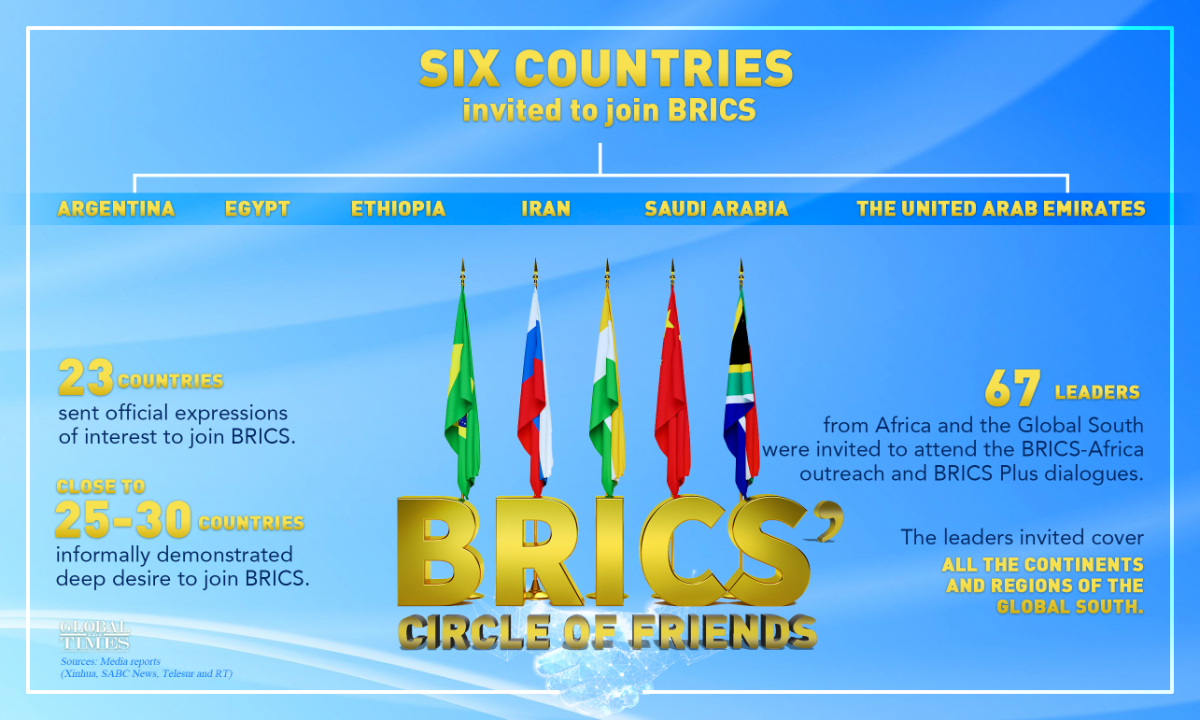
BRICS' circle of friends Editor: Zhang Mingyue/GT Graphic: Xu Zihe/GT
Strengthening forces for world stability, development
The COVID-19 pandemic posed severe challenges to Africa and other developing countries' overall development, and the strengthened cooperation between China and Africa injects greater confidence into Africa's development and into the Global South.
Moreover, growing China-Africa cooperation, as well as the continent's development, also helps boost the influence of Africa and the developing countries at international platforms, allowing the continent's voice and development demands to be heard and responded to by more countries in the international community, said Song.
Also on Thursday, a series of outcomes was announced, including adopting the Johannesburg II Declaration in reaffirm the countries' commitment to the BRICS spirit and deciding to invite Argentina, Egypt, Ethiopia, Iran, Saudi Arabia and the United Arab Emirates to become new members of the grouping.
The joining of the six new members, representing different regions, is historic, Feng Xingke, secretary general of the World Financial Forum and director of the Center for BRICS and Global Governance, told the Global Times.
The expansion of BRICS will be conducive to perfecting the management of the BRICS mechanism. Moreover, as the six countries are influential in Africa, the Middle East and Latin America, BRICS will have more vitality to represent new emerging economies and developing countries, and play a bigger role in future global governance to promote a better international order, said Feng.

